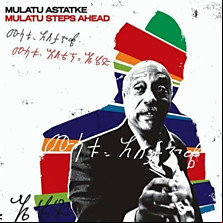BBC Review 1bj6o
He weaves his highly individual magic in an infectious and mysterious style.
Colin Irwin 2010
On the back of his highly acclaimed 2009 collaboration with London-based astral funk group The Heliocentrics – album of the year in Gilles Peterson’s Worldwide Awards – Ethiopian jazz-fusion maestro Mulatu Astatke was lured back into the studio for his first album in his own right for two decades.
Long dubbed the “father of Ethio jazz”, Mulatu’s blend of Ethiopian folk melodies with free-form jazz, Latin flavours and various Western influences gleaned from his time living in the UK and America (he was reputedly the first African student at Boston’s Berklee College of Music) made him a seminal figure during pre-Communist Ethiopia of the 1960s and 1970s.
His determined renaissance at 67 not only defies age decay, it overrides the cloying magnets of sentimentality and nostalgia that usually accompany the return to public attention and affection of a long-neglected artist in their twilight years. Far from basking in the reflected glory of his younger self, Mulatu sounds hungry, eager, innovative and even forward-thinking. His previous album with The Heliocentrics predominantly revisited various earlier classics, and this too includes radical revisions of a couple of old favourites, Boogaloo and I Faram Gami I Faram. But there’s nothing remotely retro about it. Mulatu’s peerless vibraphone soars buoyantly throughout over some intense arrangements as he throws himself into a colourfully jagged array of instrumental grooves on an album that’s constantly explorative, always fascinating and – on a track like the haunting Motherland – sometimes utterly beautiful.
Some of The Heliocentrics lend , along with of Massachusetts jazz band The Either/Orchestra, to provide additional potency and richness; yet it’s still an album that essentially works on intimacy, stealth and guile. Never does it take the grandstanding option, even when the pace steps up a gear on an inspired Afro swing arrangement of Mulatu’s Mood (featuring some gorgeous kora) and the evocative The Way to Nice. Glimmers of blues, salsa and funk seep seductively into the action, but a strong African heart drives Mulatu as he weaves his highly individual magic in a probing style that is as infectious as it is mysterious.



